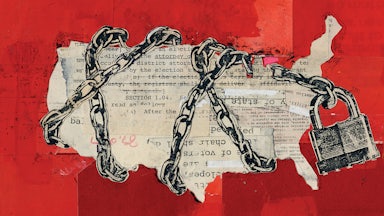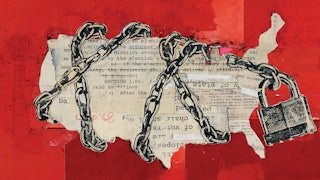In October 1829, some of the last surviving leaders of America’s founding generation gathered in Richmond, Virginia, for a state constitutional convention. Two issues dominated the gathering: suffrage and apportionment. Virginia’s 1776 constitution, drafted in the crucible of revolution, had limited the vote to white men who owned a certain amount of property. It also drew the General Assembly’s electoral districts to heavily favor the plantation-dominated Tidewater region in eastern Virginia, at the expense of the now-burgeoning western counties.
Presiding over the convention’s first session was James Monroe, who four years prior had finished his term as the nation’s fifth president. When the 71-year-old statesman took the chair, he was helped to his seat by James Madison, his 78-year-old predecessor, and John Marshall, the 74-year-old chief justice of the United States. Monroe’s opening remarks offered some support for reforms that drew upon a half-century of lessons in republican governance. He also underscored the urgency of their task. “All other republics have failed,” Monroe warned. “Those of Rome and Greece exist only in history. In the territories which they ruled, we see the ruins of ancient buildings only.” Reformers’ demands were modest by modern standards. They did not seek enfranchisement for women in any form; they denied their opponents’ allegations that they would eventually seek universal manhood suffrage and allow free Black residents to vote. But they struggled to persuade a majority of delegates to find a happy or workable medium. Eventually, they were forced to settle for a few concessions: a slight expansion of the franchise beyond freeholders to well-established renters, as well as some light redistricting to address the malapportionment in the General Assembly.
The fundamental view of the conservative bloc was best expressed by John Randolph, a dyspeptic and aristocratic slave owner who had served in Congress for decades. Randolph saw no need to open up the political system to more white male Virginians. Though only 56 years old at the time, he told the fellow delegates that he was too infirm to leave the commonwealth for good if the reformers succeeded. “But were I a young man, I would, in case this monstrous tyranny shall be imposed upon us, do what a few years ago I should have thought parricidal,” Randolph claimed. “I would withdraw from your jurisdiction. I would not live under King Numbers. I would not be his steward—nor make him my taskmaster.”
Nearly 200 years later, Randolph’s denunciation of “King Numbers”—his pejorative term for majority rule—sounds uncomfortably familiar. The right to vote is more contested now than at any point since the 1960s, when American democracy reached its modern apex. Can Democrats, equipped with the White House and a razor-thin majority in Congress, act decisively to protect majority rule in this country? Joe Biden’s presidency, and untold presidencies to come, may depend on it.
Why have voting rights been such a struggle throughout American history? Two factors among many stand out. One was inertia. Since medieval times, England had generally limited the franchise to those who owned a certain amount of land or property. Those limits would be altered by the Reform Act 1832, enacted three years after the Richmond convention, but they had been the norm when the Thirteen Colonies broke away. Since it was much easier for white male Americans to own land, however, the founding-era electorate was far larger than its British equivalent and thus more democratically involved. But the idea that the electorate itself was fungible never faded away.
Slavery was the other major factor. At the 1787 Constitutional Convention in Philadelphia, Madison told the other delegates that he instinctually thought the president should be directly elected by the people. But he also saw a flaw with this option. Not only did the Northern states enfranchise far more of their citizens than the Southern states, but a large share of the Southern population was enslaved and could not vote. That led Madison to favor the Electoral College, which allowed white Southerners to maintain parity with the North by wielding three-fifths of the electoral power that rightfully belonged to enslaved people. It’s no coincidence that nine of the first 12 presidents were Southern slave owners.
It’s true that neither the original Constitution nor the Bill of Rights explicitly mentions a right to vote. But they also provide no other route to public office. The House is directly elected. So are members of state legislatures. State lawmakers, in turn, elected senators until the Seventeenth Amendment’s ratification in 1913, and also determined how presidential electors would be chosen. The Constitution also bans nonelective forms of governance: Article 1 forbids Congress from establishing an aristocracy, while Article 4 commands the federal government to ensure that the states maintain a “republican form of government.” There could be no prince-bishoprics or hereditary duchies on American soil.
“Once a people begins to interfere with the voting qualification, one can be sure that sooner or later it will abolish it altogether,” Alexis de Tocqueville wrote in Democracy in America, six years after the convention in Richmond. “That is one of the most invariable rules of social behavior. The further the limit of voting rights is extended, the stronger is the need felt to spread them still wider; for after each new concession the forces of democracy are strengthened, and its demands increase its augmented power.” The result, he said, is a snowball effect of sorts that ultimately leads to universal suffrage.
But de Tocqueville may have given Americans too much credit, or at least given it to them prematurely. For every action to advance voting rights over the past 200 years, there was often an opposite—and sometimes equal—reaction to it. Whenever Americans sought to tear down barriers to universal suffrage, some insisted that free government would not survive. “Suffrage is the most sacred of all our rights,” James Patterson, a representative from New Hampshire, said when Congress debated the Fifteenth Amendment in 1869. “Why should we throw open this portal of political power and let into the strongholds of our government the emissaries of arbitrary power, the minions of despotism? Why should we let barbarism come in like a flood?” The irony of defending suffrage as sacred while arguing for it to be limited was apparently lost on him.
The Reconstruction era saw the establishment of multiracial democracy in the United States—as well as the shortcomings that would later allow its suppression. Historian Alexander Keyssar wrote that the debate over what would be the Fifteenth Amendment “marked the first time since the constitutional convention in Philadelphia that the national government of the United States had grappled directly and extensively with the issue of voting rights.” Members of Congress considered two versions during the monthslong debate. One of them, proposed by Massachusetts’s George Boutwell in the House and Nevada’s William Stewart in the Senate, banned restrictions on suffrage on the basis of race, color, or prior enslavement.
It was a clean, simple attempt to solve the complex problem of protecting freedmen’s voting rights in the Southern states. Some Radical Republican senators, such as Indiana’s Oliver Morton, questioned why the amendment did not go beyond race. “I think there is no more principle, there is no more justice in requiring a man to have a certain amount of property before he shall be allowed to exercise this right that is indispensable to the protection of his life, liberty, and happiness than there is in requiring him to have a white skin,” he argued. By refusing to ban literacy tests or property tests, Morton feared, the Fifteenth Amendment would merely invite alternative forms of suppression.
A group of like-minded senators rallied around a far more sweeping version proposed by Massachusetts’s Henry Wilson. It would have barred discrimination “in the exercise of the elective franchise or in the right to hold office in any State on account of race, color, nativity, property, education, or creed.” None of the proposals would have extended suffrage to women, which led to a schism among nineteenth-century feminists over whether to oppose the amendment. But Wilson’s version would have still struck down a wide swath of existing restrictions on the franchise. Many of the Jim Crow measures used to suppress Black political participation in the South, like literacy tests and poll taxes, would not have survived even the most conservative interpretation of its text. But Wilson’s version failed amid unease from moderate Republicans and opposition from Democrats, so the narrower version of the amendment won the day.
When Democrats later recaptured state legislatures across the South, they soon devised ways to exclude large numbers of Black voters without running afoul of the Fifteenth Amendment’s limited bounds. So it lay largely dormant, like Excalibur at the bottom of the lake, for nearly a century, until the federal government suddenly remembered that it could protect and promote multiracial democracy in America.
Every nation visualizes its history within certain periods. English historians usually rely on their monarchies to define time; they refer to Tudor England, Regency England, and Victorian England. In France, everything before 1789 is considered l’ancien régime, followed then by the Revolution, then a number of republics and empires. (They are currently on “republic” for the fifth time.) Germany is even more straightforward: There is the broad sweep of German history before Adolf Hitler’s rise to power and World War II, then “Stunde Null,” or zero hour, to mark Nazi Germany’s capitulation on May 8, 1945, and then the postwar era begins.
Some scholars and activists, by the same token, break down American history into presidencies or party systems. But it might be more accurate to think of our history in terms of a recurring cycle of Reconstructions. The First Reconstruction, after the Civil War, saw the birth of multiracial democracy, the enactment of laws and constitutional amendments to protect it, and then its steady decline as white supremacists pursued Redemption, Jim Crow, and nearly a century of night. Then came Brown v. Board of Education, the dismantling of de jure American racial apartheid, a wave of civil rights activism, and a federal government that would send federal agents and National Guard units to enforce it all.
From 1957 to 1968, American democracy expanded by greater leaps and bounds than at any other point since the destruction of the Confederacy. The Supreme Court enshrined the one person, one vote rule into constitutional law despite intense opposition from conservatives and business interests. Congress passed the Civil Rights Act of 1964 and the Voting Rights Act of 1965 to ensure free and fair elections across the entire country. Even the Constitution itself was amended twice more, this time to abolish poll taxes and to give presidential electors to the District of Columbia.
This time, multiracial liberal democracy proved slightly more enduring than it did in the nineteenth century. The Voting Rights Act’s most effective protections survived just shy of 50 years before a conservative Supreme Court majority gutted them in 2013. And today, multiracial democracy is under attack again, and arguably the most concerted attack in our history. Activists like the Reverend Dr. William J. Barber II, who rose to national prominence while protesting anti-democratic measures in North Carolina that same year, have argued that the right to vote is inextricably linked with fights for social and economic justice.
“We can’t accept the poverty and low wealth of 140 million Americans before Covid-19 and many more millions since,” he told a national audience during Joe Biden’s inauguration. “We must have a Third Reconstruction. We must address the five interlocking injustices of systemic racism, poverty, ecological devastation/denial of health care, the war economy, and the false moral narrative of religious nationalism. These are breaches that must be addressed ... repairing the breaches will bring revival.” He spoke not only in spiritual terms, but democratic ones as well.
John Randolph’s bitter dissent against the rule of “King Numbers” did not go unchallenged. Also in attendance at the Richmond convention was Alexander Campbell, a minister and religious reformer who lived in what is now West Virginia. Campbell had emigrated from his native Ireland to the United States when he was 20 years old; he was no stranger to living under foreign kings.
And so he spoke with a certain measure of authority when he criticized Randolph’s screed. “I was sorry to hear the other day the eloquent gentleman from Charlotte protest against His Majesty King Numbers, and declared his readiness to revolt from his government, and to migrate from his dominions,” Campbell remarked. “King Numbers, Mr. Chairman, is the legitimate sovereign of all this country. General [Andrew] Jackson, the President of these United States, is only the representative, the lawful representative of King Numbers.”
Where, asked Campbell, would Randolph flee to escape King Numbers? Almost every other state in the Union had a broader franchise than Virginia. And if Randolph emigrated overseas, Campbell told the convention, he would only find himself under even less savory rulers. “Whenever he may please to expatriate himself, he will find beyond the dominions of King Numbers, there is no other monarch save King Cypher, King Blood, King Sword, or King Purse,” Campbell cannily observed.
And on “King Numbers” himself, the minister was only effusive. “And, Sir, permit me to add there is none of those so august as our King,” Campbell said. “I love King Numbers; I wish to live, and I hope to die, under the government of this majestic personage. He is, Sir, a wise, benevolent, patriotic and powerful prince.” Campbell, who died in 1866, lived to see West Virginia become its own state, by which point King Numbers held more sway in both states.
These fights are more than just transitory partisan skirmishes. They decide who gets to decide every other issue in our politics. Will this country experience a Third Reconstruction, one that brings us even closer to the promise of multiracial democracy and majority rule? Or does a more dire fate await Americans who hope for a government that truly represents them? By defending voting rights today, Americans can also ensure that King Numbers’ reign only grows stronger. Vive le roi.








